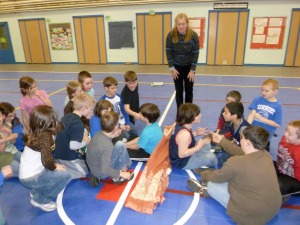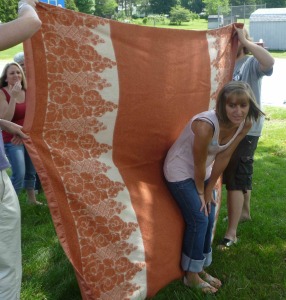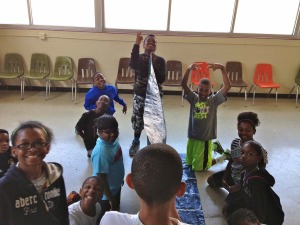Jun 01, 2018 Showing Appreciation and Celebrating Success
From the Blog Archives (June 2016)
During this time of year, I find myself facilitating many staff team-building retreats for community organizations. In my work with schools, the focus is on celebrating the end of the year and goal setting for the next. For other programs, the goal is to develop the team or staff for upcoming summer programs. It is rewarding to help these programs build positive group norms and celebrate the contributions of individuals and the group. In this week’s post, I share an old favorite “Peek-a-Who” adapted to facilitate appreciations and celebrations and build positive group norms.
“Peek-A-Who” Appreciations/Celebrations Variation
Purpose: celebrations/appreciations of others, use of descriptive language (adjectives), listening, recognizing the strengths of others, healthy trust, respect, and reflection, celebrating the community and positive group norms
• In this variation of the “Peek A Who” name game (see my fall 2012 post) one participant from each team is chosen to sit (or stand) with their back to the tarp/blanket. Two facilitators or group members hold the tarp/blanket vertically between them so that they can’t see who is on the other side of the tarp.
• When the blanket dropped on the count of three, the back-to-back pair remain with their backs to each other while their teammates describe the person from the other team, using only positive non-physical descriptors (i.e. “They are very creative,” “They are good at math,” “They climbed Mt. Washington last week,” “He was the leader of the last group challenge”).
• I encourage the group to think about what this person has contributed to the group and use examples of when this person’s strengths benefited the group – making this a reflective activity as well as a celebration
•The back-to-back pair tries to guess who is behind them based on this information.
 • This activity is an opportunity to have a discussion about what descriptive language is and the difference between physical characteristics and personal strengths or qualities
• This activity is an opportunity to have a discussion about what descriptive language is and the difference between physical characteristics and personal strengths or qualities
• Sometimes in their excitement the group gets too loud for the guessers to hear their descriptions. During one program, a 6th grader suggested that each guesser pick three people they will hear descriptors from, and it worked well. Before each term, the describers were chosen by the guesser (making sure everyone gets a chance to be a describer).
Variations: Use this as a reflection activity by asking the group members to describe the other person by their positive contributions to a specific group project or challenge.
 Facilitation Notes: Most of the time there are many memorable, positive comments; though it takes practice for some groups to stop using physical descriptors. This is a valuable opportunity for participants to celebrate the strengths and positive qualities of their peers and hear appreciations about themselves.
Facilitation Notes: Most of the time there are many memorable, positive comments; though it takes practice for some groups to stop using physical descriptors. This is a valuable opportunity for participants to celebrate the strengths and positive qualities of their peers and hear appreciations about themselves.
Outcomes/Reflection: This activity can also be a vehicle for practicing and discussing positive group norms. When something negative is said during this activity (with proper sequencing it should be a rare occurrence), it is likely it could be happening in other situations with the group, so this is an important opportunity to address the power of language and initiate a conversation on group norms.
Reference: This write up is an excerpt from the Inspired Educator, Inspired Learner book. The name variation of this activity is a New Games Foundation favorite and was coined “Peek-a-Who in Quicksilver by Karl Rohnke and Steve Butler. The appreciations version is described in Tips & Tools for the Art of Experiential Group Facilitation by Jennifer Stanchfield, Wood ‘N’ Barnes Publishing 2007 and 2016.




No Comments